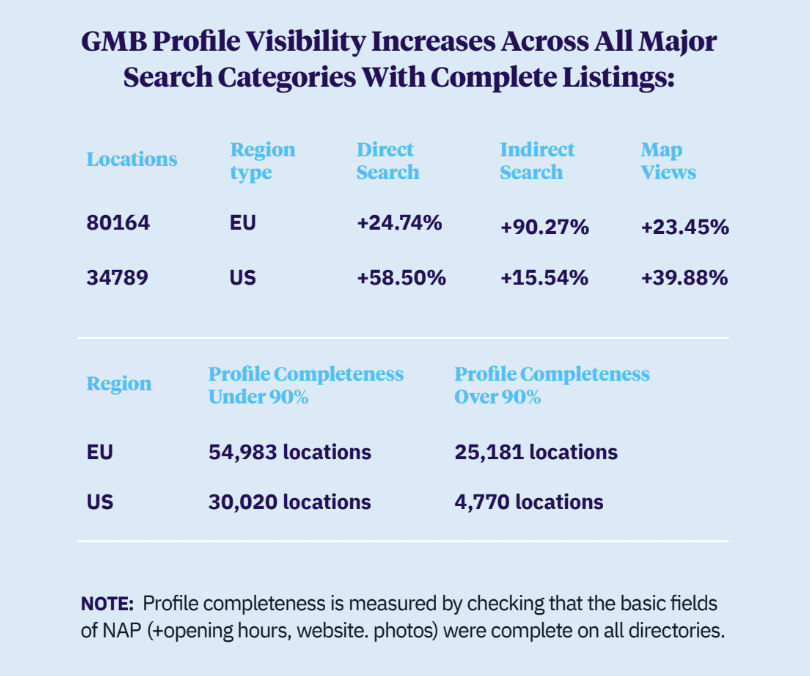Claim and Monitor Local Listings for the Ultimate Local SEO Booster
Getting found marks only the first step to success—you need customers to choose your location, then establish and drive loyalty with exceptional experiences. Yet, without that essential first step, the other two are unlikely to happen. To get that ball rolling, you need to follow proven best practices for monitoring local listings; and we’re here to help!
What Are Local Listings—And Why Are They Important For Multi-Location Businesses?
Local listings refer to online profiles—whether on a directory website, search engines, review sites, or similar—that provide the information customers need to reach you. That information includes your business name, address, phone number (often referred to by the acronym NAP) and other relevant data such as contact details and hours of operation.
Search engines, on the other hand, consider this business information essential to search indexing: a strong local SEO strategy includes a continuous process of building backlinks, with local listings affording you one of the best ways to gain those quality links so favored by search engines.
The core elements of a local listing vary depending on what is most appropriate to your business. These include your:
business name
business address
business description
service area
phone number
website URL
business hours
links to social media channels
direction instructions
images and videos
list of products / services offered
accepted payment methods
calls to action, such as making a booking or calling your office
The effort spent on these details offer good returns, as listings for SEO continue to prove themselves “essential for businesses looking to turn online interest into real-world visits and sales,” writes Alex Klugerman for Search Engine Land. Up to 87% of consumers trusted Google to evaluate local businesses in 2022, so ignoring that platform comes at a cost: leaving money on the table by leading customers to competitors.
Local listings allow customers to find accurate and consistent information, which in turn feeds the search engines’ algorithms with accurate data to populate their results, and ultimately guides customers to make more informed swift decisions. In other words, you should establish and monitor local listings to capture those essential “near me” or local searches, the ones by potential customers already in the mood to purchase.
But it’s just as important to keep these local listings up-to-date—inaccurate or incomplete local listings lead to more than missed opportunities, they can have knock-on effects on your search rankings. Local SEO puts a hefty premium on the availability of local listings, citations, and business information. Without these details, or inaccurate information, even conflicting information, you limit your chances of making the Google 3-Pack.

Does Listings Management Still Matter?
Common Challenges in Listings Management
So how do you get local listings? Some directories and digital properties may automatically create listings—and failing to claim yours risks someone else (including competitors) making claims on your behalf. These mistakes can lead to damaged reputations as well as potential security problems. That’s why the process of claiming, verifying, and monitoring local listings presents one of the most common challenges multi-location businesses face when managing their online presence.
By claiming and optimizing your business listings on Google and Apple, you will improve your local SEO performance—that’s a guarantee!
Open Google and sign in with your Google account. Search for your business and claim it or add a new one if it doesn’t appear. Follow the verification process, usually involving a postcard with a code sent to your business address. Enter the code to confirm your ownership. Then complete your Google Business Profile..
Visit Apple Business Connect and log in with your Apple ID. Add your business by entering details like name, address, and phone number. Verify your listing through a phone call or email confirmation as instructed by Apple. Then complete your Apple Place Card.
Another challenge facing listing management: staying up-to-date with changes in local SEO practices, and how each search engine tweaks their algorithm to suit consumer trends. Remember, Google’s local algorithm uses a combination of ranking factors when determining how businesses appear in search results—including the sought-after Google 3-Pack—skewing towards relevance, distance, and prominence. Any incomplete or incorrect business information in listings causes you to lose favor within those local packs downstream.
Better make a point of monitoring local listings on a regular basis:
Audit your backlink profile to ensure nothing malicious or untoward links to your online presence.
Search the web for any duplicate content indexed by search engines, so you can clean up duplicate content on your own site, contact owners of other sites or initiate a content takedown request for bad actors.
Ensure you respond promptly and appropriately to any negative comments, reviews, or press you receive for any part of your online brand mentions; and watch out for fake reviews.
Track key performance indicators like visibility metrics (e.g. impressions) engagement metrics (e.g. clicks, calls) including how they change over time.
Keep an eye on future trends in local SEO to bring your online presence in line with current search engine signals and must-haves.
Also, update business information as often as necessary to reflect your offerings accurately. If you’re changing your opening hours due to a seasonal event or customer demand, then update your local listings. The same goes for closing a location to host for a private function, changing phone numbers, launching new products, services, payment methods, or delivery options. That goes for all of your locations!
Understanding Google Business Profile Insights
What Are The Current Best Practices for Managing Multiple Local Listings?
The very nature of a multi-location business means it needs to manage and monitor local listings across a vast number of different outlets, which can make listing management very tricky indeed.
Create a Centralized Dashboard
With at least 25 local business directories you cannot afford to ignore—from Google to Yelp, TripAdvisor to the Yellow Pages, Meta’s many digital properties to all the review platforms, and other social media sites your potential customers consult— a centralized platform to consult removes the need for your local marketers to dedicate considerable time and energy towards updating NAP consistency.
Use monitoring tools to create a centralized dashboard from which you can monitor local listings, one of the most efficient ways to manage this level of online presence. For example, ORLEN moved to managing its business listings on a centralized platform and gained a 77% increase in impressions on Google Maps and a 20% increase in clicks on local landing pages.
Leverage Partnerships with Local Listings Providers
Monitoring tools can also assist with building a more international audience. Take the example of Nicolas, a French wine specialist with a strong reputation in retail within their home markets, now looking to grow an international audience more used to buying wine in supermarkets.
To earn brand recognition abroad and demonstrate the value of visting specialist suppliers, Nicolas leveraged partnerships with major directories such as Tripadvisor, Alexa, and Apple Maps, more effectively reaching the one billion iPhone users worldwide. The result of this listing management? An uplift of 211% in views on Google search and maps, and a 9.6% rise in clicks for directions.
Update Information Quickly and Efficiently
Once you establish your process with monitoring tools, you can set up new locations and keep NAP consistency for everyone much more effectively. Fast-growing restaurant franchise Pizzaville uses centralized listings management and monitoring tools to accurately set up new locations as it grows, and to easily update holiday hours or store closures as franchisees require, all at a click.
This allows for quick and efficient updates across regions, maintains accuracy in local listings, and resulted in a 78% increase in clicks for Google directions, a 65% boost in Google Clicks to Call, and a 73% uptick in impressions on Google Maps.
A Buyer’s Guide to Listing Management Tools
If all of this sounds like magic, how can you pick the right tool for your multi-location needs?
Simplified and Secure Data Management
First and foremost, given the ubiquity of Google as a search engine choice, the listings management tool should empower you to master the local 3-Pack. This means that, without leaving your centralized portal, you should be able to address not only NAP consistency, but also add high-priority items for ranking signals: short videos, images, call to action links. Your platform should also simplify the process of identifying and addressing any duplicate listings or conflicting information, while providing performance insights that present new opportunities for further optimization.
Content and Technical SEO Optimization
Content remains key for listing management, so consider how you might create content collections to add and update rich data across all of your locations, and how you would centrally create and manage menus for all of your local pages. Also consider whether your listing management platform provides keyword recommendations that keep descriptions on-brand without sacrificing optimizations for search visibility.
Strong Partnerships & Direct Integrations
Your online presence should account for more than your Google Business Profile: other local listings and local SEO elements, such as citations, also impact results. Find a listing management tool that connects to the major influential networks—such as Apple Maps, Facebook, Yelp—so you can optimize all of your signals efficiently from a single dashboard.

In this age of smart assistants, it’s also worth considering voice optimization, to ensure Alexa, Siri, and their friends can bring your site to potential customers, too. Your listing management tool also needs the backing of strong technical partnerships, to ensure they integrate new features and collaborate on new developments that maintain your businesses’ competitive edge.
In short, you want something like Uberall’s AI-powered multi-location marketing platform.
Conclusion
There’s no doubt that local listings enhance local SEO, increase visibility and reach, improve your reputation and credibility, and create better opportunities for customer engagement; all of which provide competitive advantages at each of your locations.
Uberall’s listings management platform helps you to create, manage, and optimize your business profiles across more than 125 online directories that point to your physical locations. As a proven winner, Uberall provides superior visibility, with 140% more impressions in non-branded search, 33% more impressions in branded search, and 5x returns on marketing investment
How Do Local Listings Impact Visibility & Conversions?

